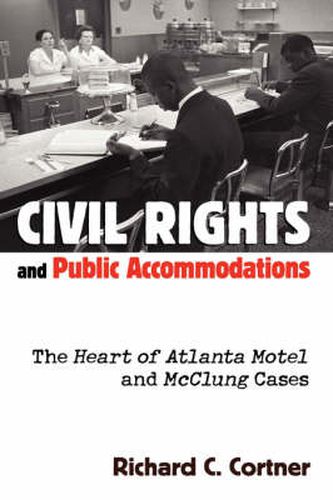Civil Rights and Public Accommodations: The Heart of Atlanta Motel and McClung Cases
Richard C. Cortner

Civil Rights and Public Accommodations: The Heart of Atlanta Motel and McClung Cases
Richard C. Cortner
This title is printed to order. This book may have been self-published. If so, we cannot guarantee the quality of the content. In the main most books will have gone through the editing process however some may not. We therefore suggest that you be aware of this before ordering this book. If in doubt check either the author or publisher’s details as we are unable to accept any returns unless they are faulty. Please contact us if you have any questions.
The struggle for civil rights in America was fought at the lunch counter as well as in the streets. It ultimately found victory in the halls of government - but, as Richard Cortner reveals, only through a creative use of congressional power and critical judicial decisions. Title II of the 1964 Civil Rights Act prohibited discrimination in public accommodations, and shortly after its passage blacks were refused service at the Heart of Atlanta Motel and at Ollie’s Barbecue in Birmingham, Alabama, as a test of the new law by business owners who claimed the right to choose their own customers. These challenges made their way to the Supreme Court, becoming landmark cases frequently cited in law. Until now, however, they have never benefited from book-length analysis. Cortner provides an inside account of the litigation in both decisions to tell how they spelled the end to segregation in the South. The fact that blacks could not travel in the South without assured access to food and lodging led Congress to enforce civil rights on the basis of its authority to regulate interstate commerce. The Supreme Court unanimously sustained Title II’s constitutionality under the commerce clause in both test cases, joining the executive and legislative branches in defining the power of the federal government to desegregate society, even by circuitous means. Drawing on justice department files, Supreme Court justices’ papers, and records of defense attorneys, Cortner provides the background for the cases, including previous legal battles over sitins. He describes the roles of key players in the litigation - particularly Solicitor General Archibald Cox and members of the Warren Court. In addition, he uses presidential files, oral histories, and other primary sources to give readers a clear picture of the forces at work in the creation, implementation, and validation of the Civil Rights Act. Cortner’s thorough account illuminates the nature of constitutional litigation and the judicial process, as well as the role of the Constitution and law, in two decisions that marked the crowning achievement of the civil rights movement and changed the face of America forever.
This item is not currently in-stock. It can be ordered online and is expected to ship in 7-14 days
Our stock data is updated periodically, and availability may change throughout the day for in-demand items. Please call the relevant shop for the most current stock information. Prices are subject to change without notice.
Sign in or become a Readings Member to add this title to a wishlist.


